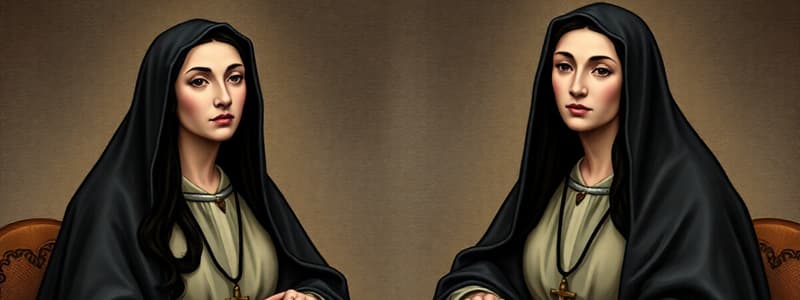Podcast
Questions and Answers
What concerns did Teresa have about disclosing her call to a new ministry?
What concerns did Teresa have about disclosing her call to a new ministry?
- She feared she would lose support from her family.
- She thought her fellow sisters would be envious of her.
- She was afraid of being considered unfaithful.
- She worried she would be seen as proud. (correct)
What was one major sacrifice Teresa faced in her call to serve the poor?
What was one major sacrifice Teresa faced in her call to serve the poor?
- Living without companions.
- Teaching in a poorer school.
- Giving up the comforts of her sisterhood. (correct)
- Working in dangerous neighborhoods.
How long did it take for Teresa to obtain permission to leave the Loreto Sisters?
How long did it take for Teresa to obtain permission to leave the Loreto Sisters?
- Three years.
- Six months.
- One year.
- Two years. (correct)
Who played a significant role in supporting Teresa's journey to her new ministry?
Who played a significant role in supporting Teresa's journey to her new ministry?
What was the primary type of challenge Teresa encountered when starting her new ministry?
What was the primary type of challenge Teresa encountered when starting her new ministry?
What was the initial requirement from the archbishop regarding Teresa's status?
What was the initial requirement from the archbishop regarding Teresa's status?
Which document did Teresa write to initiate her secularization process?
Which document did Teresa write to initiate her secularization process?
What did the Vatican grant to Teresa in response to her request?
What did the Vatican grant to Teresa in response to her request?
What condition did the archbishop impose on Teresa after granting her secularization?
What condition did the archbishop impose on Teresa after granting her secularization?
What was one of the recommendations given to Teresa before she received the Vatican's response?
What was one of the recommendations given to Teresa before she received the Vatican's response?
What item did St. Teresa of Calcutta purchase to symbolize her new order?
What item did St. Teresa of Calcutta purchase to symbolize her new order?
What was the response of some Loreto Sisters to St. Teresa's departure?
What was the response of some Loreto Sisters to St. Teresa's departure?
What was St. Teresa's emotional state as she left her Loreto habit?
What was St. Teresa's emotional state as she left her Loreto habit?
Why did St. Teresa recognize a need to gain knowledge in first aid?
Why did St. Teresa recognize a need to gain knowledge in first aid?
What was the age of St. Teresa when she left the Loreto order to start her new ministry?
What was the age of St. Teresa when she left the Loreto order to start her new ministry?
What was Périer's initial reaction to Teresa's proposed ministry?
What was Périer's initial reaction to Teresa's proposed ministry?
What concern did Périer express about his own experience in India?
What concern did Périer express about his own experience in India?
How did Périer react to the idea of a newly arrived priest discussing ministry with him?
How did Périer react to the idea of a newly arrived priest discussing ministry with him?
What specific instructions did Périer give to Van Exem regarding Teresa?
What specific instructions did Périer give to Van Exem regarding Teresa?
What was Teresa's posting at the time of her conversation with Périer?
What was Teresa's posting at the time of her conversation with Périer?
What does Jesus's expression 'I thirst' signify for Teresa?
What does Jesus's expression 'I thirst' signify for Teresa?
What aspect of crucifixion contributed to the victims' sense of isolation?
What aspect of crucifixion contributed to the victims' sense of isolation?
What conclusion did Mother Teresa draw about the wealthy?
What conclusion did Mother Teresa draw about the wealthy?
What was Mother Teresa’s primary mission before serving the poor?
What was Mother Teresa’s primary mission before serving the poor?
What did Teresa feel about leaving her teaching role?
What did Teresa feel about leaving her teaching role?
What was Fr. Van Exem's initial role in relation to St. Teresa of Calcutta?
What was Fr. Van Exem's initial role in relation to St. Teresa of Calcutta?
Which route for seeking permission to leave the Loreto Sisters did Fr. Van Exem strongly support?
Which route for seeking permission to leave the Loreto Sisters did Fr. Van Exem strongly support?
What advice did Fr. Van Exem give to St. Teresa regarding her approach to the Archbishop of Calcutta?
What advice did Fr. Van Exem give to St. Teresa regarding her approach to the Archbishop of Calcutta?
What was the main concern about the Direct Petition to the Vatican option suggested by Fr. Van Exem?
What was the main concern about the Direct Petition to the Vatican option suggested by Fr. Van Exem?
In addition to guiding St. Teresa, what practical help did Fr. Van Exem provide her?
In addition to guiding St. Teresa, what practical help did Fr. Van Exem provide her?
What was the primary motivation behind St. Teresa of Calcutta's call to a new ministry?
What was the primary motivation behind St. Teresa of Calcutta's call to a new ministry?
How did St. Teresa of Calcutta primarily communicate with Christ in her ministry?
How did St. Teresa of Calcutta primarily communicate with Christ in her ministry?
What group was directly founded as a result of St. Teresa's understanding of her call?
What group was directly founded as a result of St. Teresa's understanding of her call?
Which biblical figure did St. Teresa of Calcutta associate her call with?
Which biblical figure did St. Teresa of Calcutta associate her call with?
What concept did St. Teresa emphasize regarding the words of Christ?
What concept did St. Teresa emphasize regarding the words of Christ?
What event did Mother Teresa reflect on as the beginning of her spiritual journey?
What event did Mother Teresa reflect on as the beginning of her spiritual journey?
What did Jesus refer to Mother Teresa as during her interior locutions?
What did Jesus refer to Mother Teresa as during her interior locutions?
How did Mother Teresa perceive the impoverished individuals she encountered?
How did Mother Teresa perceive the impoverished individuals she encountered?
Which community did Mother Teresa serve primarily during her time in Calcutta?
Which community did Mother Teresa serve primarily during her time in Calcutta?
What did Mother Teresa believe was necessary to quench Jesus' thirst as it relates to the impoverished?
What did Mother Teresa believe was necessary to quench Jesus' thirst as it relates to the impoverished?
What initial intention did the archbishop have for Mother Teresa's move to Asansol?
What initial intention did the archbishop have for Mother Teresa's move to Asansol?
How long did Mother Teresa experience a sense of sweetness and consolation during her time in Asansol?
How long did Mother Teresa experience a sense of sweetness and consolation during her time in Asansol?
What was Archbishop Périer's reaction to Mother Teresa's ecstatic experiences in Asansol?
What was Archbishop Périer's reaction to Mother Teresa's ecstatic experiences in Asansol?
What condition did Archbishop Périer impose on Mother Teresa for her to leave the Roman Catholic Church?
What condition did Archbishop Périer impose on Mother Teresa for her to leave the Roman Catholic Church?
What was the response of the priests advising Mother Teresa regarding her petition to leave her vows?
What was the response of the priests advising Mother Teresa regarding her petition to leave her vows?
What significant medical procedure did Sister Teresa perform on the Dalit man?
What significant medical procedure did Sister Teresa perform on the Dalit man?
Who recounted a story about Mother Teresa and became friends with her?
Who recounted a story about Mother Teresa and became friends with her?
What was Mother Teresa's response when asked about a specific story recounted by Navin Chawla?
What was Mother Teresa's response when asked about a specific story recounted by Navin Chawla?
In which city did Sister Teresa intern at a hospital run by Medical Mission Sisters?
In which city did Sister Teresa intern at a hospital run by Medical Mission Sisters?
What happened to both Sister Teresa and the patient after the amputation?
What happened to both Sister Teresa and the patient after the amputation?
Study Notes
Teresa's Journey to Secularization
- Teresa's journey to leave the Loreto motherhouse began as a request for secularization.
- Her final vows were unbreakable, requiring permission from Van Exem, her general superior, as well as the Archbishop.
- The archbishop mandated that Teresa be secularized, and the Loreto motherhouse responded to her request within a month.
- Teresa was granted both secularization and exclaustration by the Vatican, granting her the choice to either leave the order completely or stay as a nun.
- The Archbishop placed a one-year probationary period on Teresa to ensure her suitability for secular life.
Teresa's Call to Ministry
- Teresa struggled with the realization that her call to serve the poor would mean sacrificing the comforts of her Loreto sisterhood.
- She left the Loreto Sisters to work among the poor, enduring a bureaucratic process that took two years to obtain permission from her order and an additional year for her ministry to be sanctioned.
- Her confessor, Fr. Celeste Van Exem, provided significant support and advice regarding her call to ministry.
St. Teresa of Calcutta
- Teresa adopted a blue-edged sari after leaving the Loreto Sisters and began her ministry to the poorest of the poor, a decision that caused shock and distress among her fellow sisters.
- Her initial focus was on the Dalits, a marginalized group often dying on the streets due to lack of healthcare.
- Teresa recognized a need to gain knowledge in first aid to better serve the poor.
Fr. Van Exem & St. Teresa of Calcutta
- Fr. Van Exem, a polyglot fluent in several languages, initially came to India to foster Christian-Muslim dialogue but became heavily involved in supporting St. Teresa’s ministry.
- He advised St. Teresa to discern her call over several months and then proposed two options for obtaining permission to leave the Loreto Sisters:
- Direct Petition to the Vatican: This was a quicker route but lacked an appeal process.
- Through the Archbishop of Calcutta: This route would allow for a potential appeal if the Archbishop rejected Teresa’s petition.
- Fr. Van Exem strongly supported the second route and aided St. Teresa in writing a letter to the Archbishop, offering advice on what to say if the Archbishop wished to interview her.
St. Teresa of Calcutta: A Description of the Instrument
- St. Teresa believed she heard a clear call from Christ to undertake a new ministry, characterized by prayer and service to marginalized people.
- This call was deeply connected with Christ's thirst for love and care, associating it with the Samaritan woman and the final moments of Christ's life.
- St. Teresa's founding of the Missionaries of Charity directly stemmed from this call.
- She continued to receive this call throughout her life, emphasizing that Christ's words are not just from the past but alive and relevant in the present.
The Call Within a Call
- The Archbishop, Périer, was initially hesitant to support Mother Teresa's ministry, citing concern about the hardship involved and a disdain for the Dalits.
- Périer, annoyed by Mother Teresa’s new ministry, instructed Fr. Van Exem to counsel her to keep her desires to leave Loreto a secret.
- A panel of priests, including Van Exem, were commissioned to advise Périer on Mother Teresa’s petition.
- Mother Teresa was assigned to a posting at the Loreto convent in Asansol, a town three hours away from Calcutta, though whether this was coincidental or a suggestion from Périer remains unclear.
The Call Within a Call
- During a 1946 train journey, Mother Teresa received a letter from Divine Light and Love, which marked the beginning of her spiritual journey.
- She understood that helping those in need was serving Christ.
- Mother Teresa had a revelation on a Darjeeling train, concluding that the impoverished were Christ in physical disguise.
- She recognized that Christ embodied in the Dalit women, children, and men also thirsted for material aid.
Mother Teresa's Experiences in Asansol
- Mother Teresa experienced six months of ecstatic experiences in Asansol, feeling connected to God, but the Archbishop was unimpressed by her experiences.
- While in Asansol, Périer returned to Europe to consult with other Jesuits about Mother Teresa's petition.
- After returning to Calcutta, two priests, including a canon lawyer, advised that there was no obstacle to her petition.
- Périer granted Mother Teresa permission to request release from her vows from her general superior but stipulated that she had to request an "indult of secularization" to formally leave the Roman Catholic Church.
Jesus's "I thirst"
- Jesus’s “I thirst” signified the longing for love Jesus felt in his final moments and that Christ in the distressing disguise of the world’s poor thirsted for kindness, love, and compassion.
- Mother Teresa believed that the thirst for love was felt by everyone, even the wealthy, concluding that this was especially pandemic among the well-off who possess all the creature comforts of life but whose interiors are blighted with a sense of loneliness and alienation.
- Working with children made Teresa "the happiest nun in the world," and forsaking it was a "great sacrifice."
The Call Within a Call: Experiences in Patna
- Mother Teresa interned for half a year at a hospital run by the Medical Mission Sisters in Patna.
- Years later in Calcutta, she encountered a Dalit man with a gangrenous thumb, and she quickly amputated it.
- This story was later recounted to Mother Teresa by Navin Chawla, an Indian government official, who was close friends with her.
- Mother Teresa confirmed that the story was a made-up story, but she laughed and said it pleased her enormously.
Studying That Suits You
Use AI to generate personalized quizzes and flashcards to suit your learning preferences.
Description
Explore Teresa's transformative journey as she navigated her request for secularization from the Loreto motherhouse. Discover the challenges she faced in leaving her order to serve the poor, including the necessary permissions and the personal sacrifices involved. This quiz delves into her pivotal moments and decisions that shaped her ministry.




